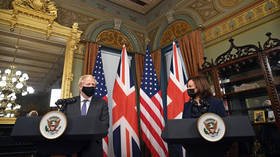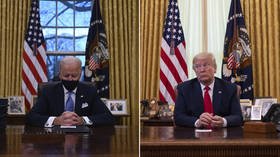When will Brits recognize that the US won’t reward the UK’s unquenching loyalty, but will happily use our country as it sees fit?

The British prime minister, in Washington to see Joe Biden, has bent over backwards to suck up to Washington and big up ‘Anglophone exceptionalism’ and the ‘special relationship’. His payback? Zilch.
Boris Johnson is grovelling to the US, and it’s been a week full of it for him, doing everything from the controversial AUKUS nuclear subs deal, to the desperate attempts between him and his new foreign secretary visiting America to try and budge Washington into giving the UK a free trade agreement, the very kind Brexit promised.
His only argument for it appears to be “Anglophone exceptionalism,” and to nobody’s surprise it isn't happening. Downing Street's efforts have been rebuffed by the White House, adding to a litany of frustrations to this much fanaticized deal, which also failed to make any kind of breakthrough under Trump, despite that President being much more publicly in favour of it.
Also on rt.com The stunning betrayal of France by America over nuclear subs for Australia signals a huge geopolitical shift in US strategyDoesn’t the US owe its “brothers across the Pond” something for their loyalty? Not a chance. If last week's drama with France is anything to go by, the United States has absolutely no interest in brokering a trade deal purely upon ideology or identity, which is principally the reason Britain wants it in the first place.
The United States is very dogmatic, and when it comes down to trade and business it is the most unapologetically self-interest driven country on earth. With the current mantle of US politics falling on protectionism, there’s no way it’s going to grant Johnson a trade deal short of anything but a complete capitulation to their terms, to the point that would make it electorally untenable for the Conservatives.
If it hasn’t been apparent enough already, Brexit is a foreign policy move premised on reactionary identity politics and not calculated on reason or national interest. It’s based on an ideological rejection of “Europeanism” – that is continental integration, intergovernmentalism and a pooling of sovereignty – in preference for so-called Anglophone exceptionalism.
This is the somewhat fanciful idea that the UK is something different, special and belongs “in the world” as a power of its own. In the favoured language of the Brexiteers, this is “Global Britain,” bringing with it a nostalgia for “free trade” in the manner the British Empire once conducted.
These beliefs are rooted in the fact that continental Europe has very different geopolitical experiences and outlooks than the island of Britain, which stands proudly aloof and gave it a confidence in every European based war of the last two centuries. But, even if one buys that argument, how does that translate into what is in Britain’s national interest now?
This rendering of identity quite helpfully explains Britain’s newly self-appointed role as an “Indo-Pacific” power(despite being located thousands of miles away), its obsession with maritime adventurism against China, and its desire to forge closer ties with the “like minded countries” of the Anglosphere, America, Australia, Canada and New Zealand, the colonial “offspring” of British imperialism.
Hence Johnson has forged an agreement with Australia and applied to join the Trans-Pacific Partnership, a trade agreement involving 12 Pacific Rim nations. But the crown jewel of his Brexit project has always been securing a free trade agreement with the United States, invoking the zeal of the “special relationship” and transatlanticism, forged in the common experiences of World War II, right?
Except America is having none of it. The US pursues deals strictly in its national interests and in transactional terms and never on a fraternal basis or as a favour to another. Discussions are getting nowhere as the Biden presidency does not see such a deal as a priority right now, if ever. There’s a number of reasons why. American politicians, on both sides of the divide, have come to believe that the principle of free trade is bad and against US interests – a legacy planted by Trump that has become an all-embracing consensus. American economic and trade policy is now exclusively about the jobs which can be created back home, not in other countries, and for what America can sell to others, not for what it can buy.
Britain falls against both of these hurdles as it offers little to America and seeks something for itself. A huge market like China with an enormous population is great for exporting American soybeans and beef by the shipload, meaning for all their mutual enmity the US can cut deals with Beijing, but the United Kingdom? A small island with fewer than 70m people that has cut its own trading ties with the surrounding continent? What's the point?
Britain gets the huge market of America, while, well, America gets the much smaller market of Britain. It's obvious who’s going to benefit more, and it is no coincidence therefore that the US has made very, very strict demands for any potential deal. For example, the Trump administration demanded that the UK open up its agricultural market entirely, import US hormone beef, chlorinated chicken and remove “country of origin” labelling in supermarkets. The proposals provoked outrage from the public and media, leading it to be shelved until the new administration came in.
Nothing has changed in the US view, but despite this tedious reality, Johnson has doubled down on his Anglophone exceptionalist mantra, lavishing praise upon praise on Washington. This has led to accusations, most especially from France in the heat of the AUKUS controversy, that he is an “opportunist” and little more than a US lapdog, in their own words. When will the British public wake up and recognize the US is not returning favours to Britain for unquenching loyalty, but will happily use the UK as it sees fit as an extension of its own interests?
What is good for America is not necessarily good for Britain. It’s as if the whole debacle over the US leaving Britain out in the cold over Afghanistan has been completely forgotten already, and the answer is to simply double down on the relationship with Washington’s leaders even more, chasing after them as they carefully do whatever they want.
The pitiful rejection of a UK-US trade deal and Boris’ desperate grovelling, as well as the bizarre proposal to join the US-Canada-Mexico agreement, illustrates just how one-sided this relationship truly is. The British government is blind to it, however, because their foreign policy is increasingly weighted on nostalgia and identity, rather than practicality.
In upping the amplitude of confrontation against Beijing by joining the AUKUS proposal, Britain gets nothing in return for it, while America now seeks the military containment of our island’s largest import partner, China. We ultimately risk losing everything, and for what? For a plateful of US hormone-grown beef? I’m not sure the British public will swallow that.
Like this story? Share it with a friend!
The statements, views and opinions expressed in this column are solely those of the author and do not necessarily represent those of RT.
















